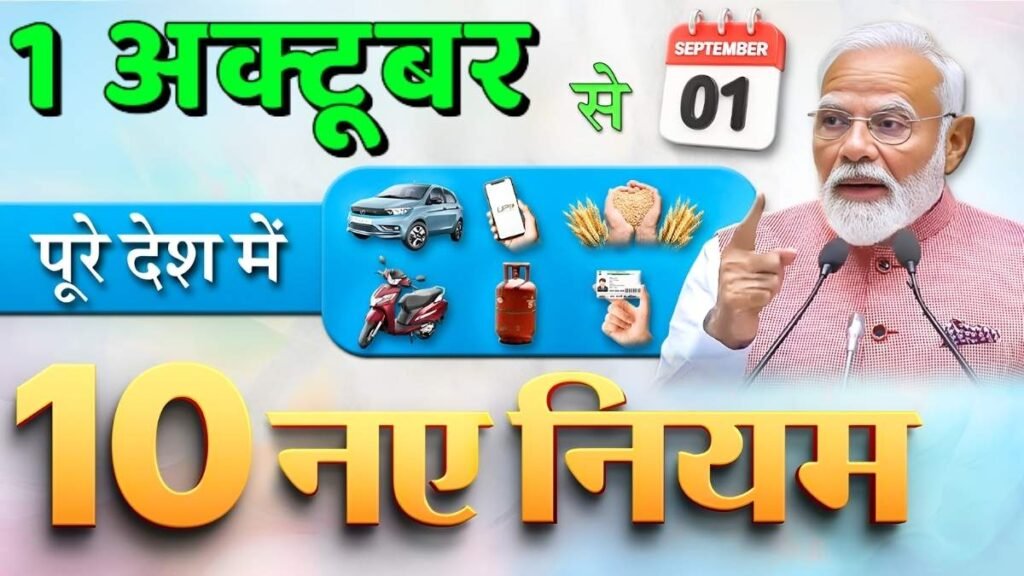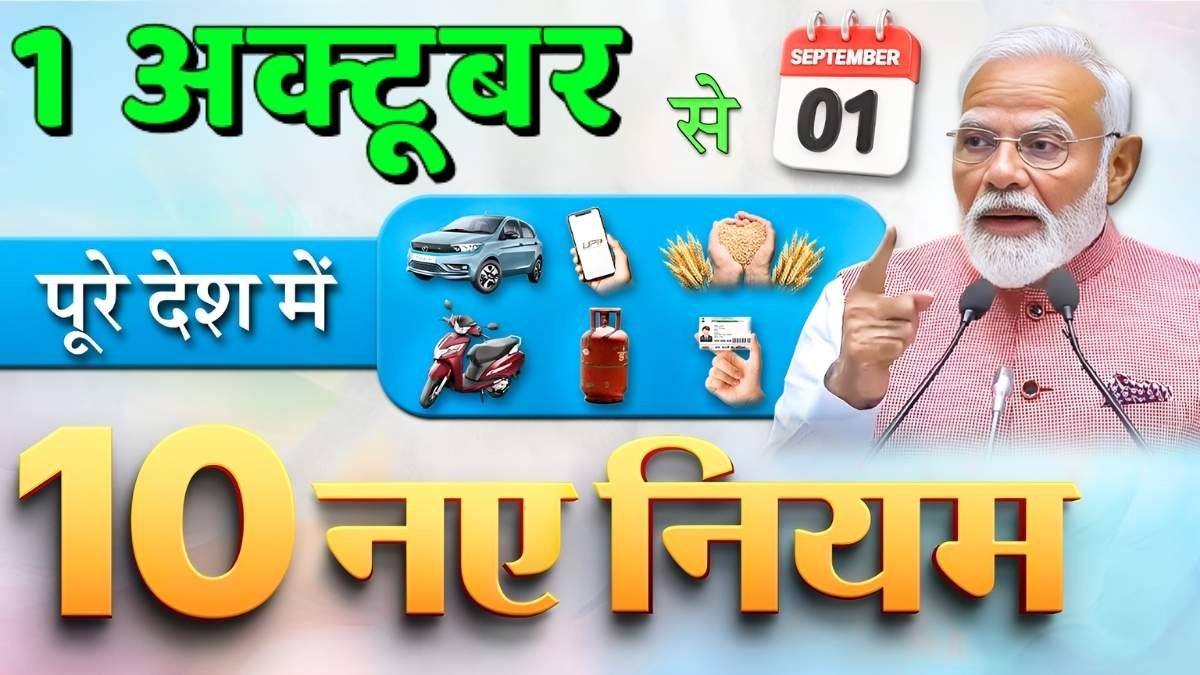As India steps into October, the government is set to roll out a slew of fresh regulations that will directly affect the daily lives of citizens. These new rules span areas such as taxation, compliance, safety, digital services, and citizenship rights. While many of them aim to strengthen governance and streamline processes, their immediate impact will be felt across households and businesses.
In this post, we explore ten major changes taking effect from 1st October, explain what they mean in practice, and highlight how you might need to adapt in your personal or professional life.

Tax Changes
One of the most widely discussed adjustments from 1st October involves changes in tax policies. Some rates for certain goods may be tweaked, and thresholds for taxation could be redefined. The government aims to bring more clarity and reduce tax evasion through updated compliance norms. For individuals and small businesses especially, this means revisiting accounting practices, ensuring timely filings, and possibly recalculating budgets to absorb any increase in tax burden. Though some segments may see relief through exemptions or rebates, many citizens will need to adapt to the new pricing and compliance structure.
Digital Mandates
A second domain undergoing major overhaul is the sphere of digital services and identity verification. New rules may mandate stricter authentication norms for online transactions, additional verification steps for digital wallets, or more detailed KYC (know your customer) procedures. In some cases, you might be asked to provide fresh identification proofs, biometrics, or supplementary documentation before continuing to use digital banking or e-commerce platforms. This is meant to reduce fraud and strengthen security, but citizens must remain vigilant and ensure their own documents and accounts are updated to avoid service interruptions.
Safety Norms
Another important shift applies in the area of public and workplace safety. From constructions to public transport, new safety protocols will be enforced more strictly. Inspections may be ramped up, penalties for violations may increase, and compliance documentation will carry more weight. If you live in or manage properties, or operate a small business with physical premises, you will likely need to review safety equipment, fire exits, structural compliance, and employee training. Failing to align with these new norms could lead to fines or even closure in worst‑case scenarios.
Licensing Reforms
A key regulatory area to watch is licensing and permits. The government intends to streamline certain permits while tightening others. Some sectors previously exempt may now require formal permissions, and renewal procedures may be more rigorous. For citizens, this may affect everything from trade licenses to permits for food businesses, shop operations, or even local services. If your work or livelihood depends on a license, you must check whether your current permits remain valid or need updating under the new rule set.
Environmental Rules
India has long committed to environmental protection, but starting 1st October, a new tranche of regulations will come into force. Emissions standards may be stricter, waste disposal protocols more regulated, and green compliance may become mandatory for more industries. Residents may even need to adhere to new rules about plastics, e‑waste, or rainwater harvesting. For households, this could translate into mandates on how to dispose of electronic items or how to segregate trash. Local municipalities might also require stricter adherence to environmental norms when granting local approvals.
Consumer Rights
From 1st October, consumer protection undergoes a fresh update. The government may expand the rights of buyers in e‑commerce contexts, demand faster refunds, mandate clearer return policies, or strengthen grievance redressal mechanisms. This change is intended to empower citizens when transactions go awry, whether buying electronics online, ordering consumables, or booking services. You may see more uniform policies across platforms, and businesses will be legally bound to honor consumer demands more faithfully than before.
Education Mandates
In the education sector, new rules will aim to recalibrate standards across schools, colleges, and educational services. There may be stricter accreditation norms, updated curriculum standards, or additional reporting requirements. Some private institutions could face new registration rules or oversight. As a student, parent, or educator, you may see adjustments in fee structures, course offerings, facility inspections, or syllabus content. It will be wise to stay informed about how your institution is complying and whether any new guidelines affect your enrollment, exam timelines, or quality standards.
Labor Norms
Workplace regulations are also on the cusp of change. From 1st October, there may be new rules concerning contract work, minimum wages, leave entitlements, or social security contributions. Enforcement will likely be more rigorous, with inspections and penalties for violations becoming stricter. Employees and employers alike must be aware: you may see shifts in how benefits are calculated, how contracts are structured, and what your legal protections are. If you run a small firm or manage payroll, it’s critical to review your compliance practices ahead of schedule.
Health Standards
Another area seeing reform is public health, especially in urban settings and workplaces. New norms might address air quality, sanitation, medical waste disposal, or workplace health measures. Hospitals, clinics, and diagnostic centers may need to upgrade their equipment or practices to match the updated regulations. In day‑to‑day life, citizens should expect increased inspections of food hygiene, stricter licensing for medical labs, or sharper oversight of pharmaceutical practices. Adapting early will help avoid penalties and ensure safe access to health services.
Citizenship Rights
The final major shift involves rules related to identity, citizenship, and resident status. Starting 1st October, there may be new verification norms, updated residency registration requirements, or novel obligations for certain categories of citizens and non‑citizens alike. This could influence how passports, voter IDs, ration cards, or public benefit certifications are renewed or validated. If you reside in areas with special schemes, migration status, or transitional registrations, you should proactively check whether your credentials remain valid or need fresh submission under new guidelines.
Disclaimer: The information provided in this article is for general awareness only. Readers are advised to verify details with official government sources or legal experts before making any decisions based on the mentioned rules or regulations.
